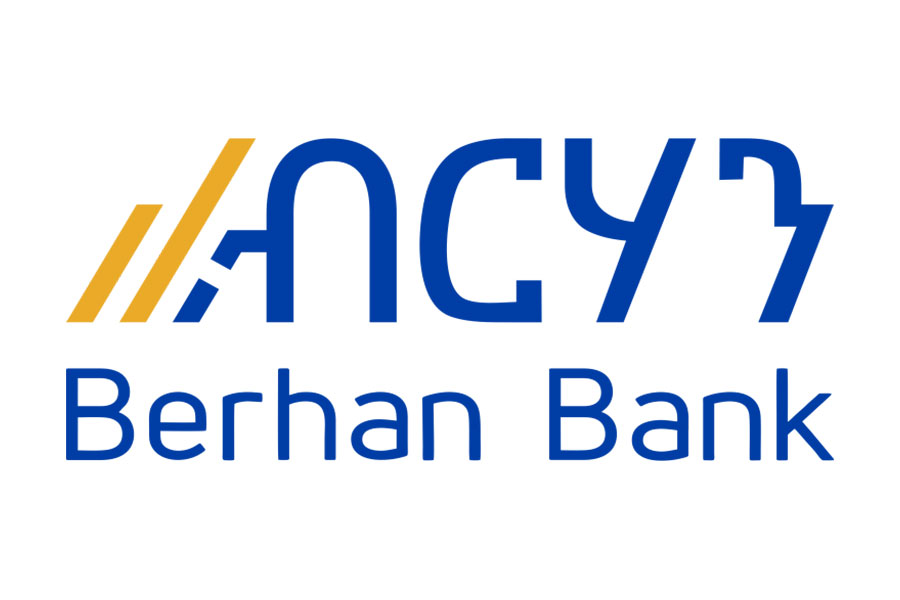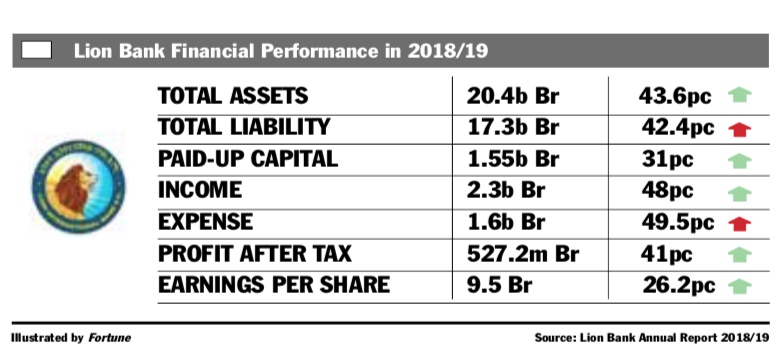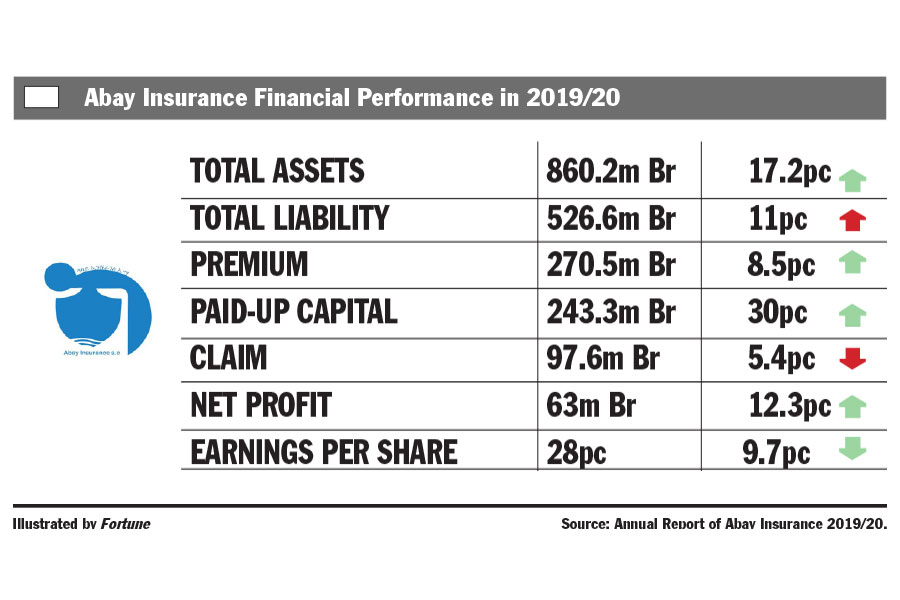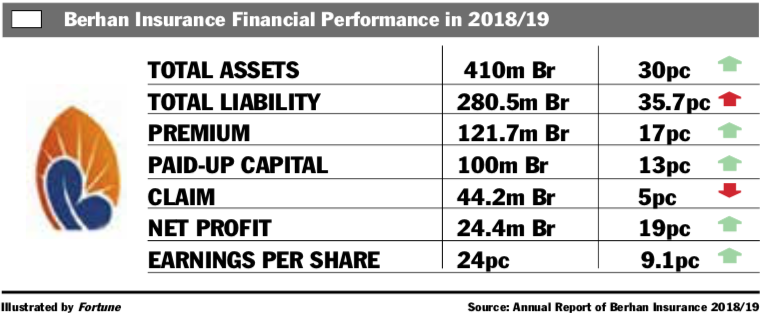
Fortune News | Nov 07,2020
Berhan Insurance, one of the latest entrants in the insurance industry, registered remarkable growth over the past fiscal year. Its net profit reached 33.7 million Br, marking a 27.6pc rise from the previous year.
The profit expansion drove the earnings per share (EPS) to grow by five percentage points to 29pc. Berhan’s EPS posted growth while many financial institutions reported a decline in share returns over the reporting period.
The profit and EPS performance of Berhan is impressive, according to Abdulmenan Mohammed, accounts manager at the London-based Portobello Group and a financial statement analyst with close to two decades of experience.
"Achieving growth in a year when many financial institutions had volatile performances is remarkable,” said Abdulmenan.
The positive performance was achieved despite the challenges the firm encountered in the past fiscal year, according to Tewodros Meheret, board chairperson of Berhan.
“It was the most challenging operational year due to the global COVID-19 outbreak, political instabilities and economic slumps,” remarked Tewodros. “Our company has been operating in this milieu, facing all the hurdles in addition to the peculiar predicaments of the sector.”
Growth in gross premium and underwriting surplus, an income spike from investment activities, and controlled claims growth have helped Berhan achieve its commendable performance.
During the reporting period, Berhan’s underwriting surplus expanded by 37pc to 61.4 million Br. The gross premium also went up by 15pc to 139.8 million Br. Out of the gross premium, 23pc was ceded to reinsurers, leading the retention rate to drop slightly from last year’s rate of 77.7pc.
The rate is still the same as the industry average, remarked the expert.
Alemayehu Tefera, CEO of Berhan, explained that retention limits for different insurance products are situational. One year, the firm can have insurance policies that fall under its capacity, while it might have insurance policies with higher risk and need coverage from reinsurers at other times.
"But we still operate in line with the National Bank of Ethiopia's requirements," Alemayehu said.
A directive from the central bank requires insurance companies to have a gross risk retention rate greater than five percent but less than 10pc of their paid-up capital.
Berhan earned 7.1 million Br in commissions from reinsurers, an increase of 19.5pc. The commissions that the company paid to agents also went up by 9.3pc to 4.7 million Br.
Berhan's claims paid and provided for climbed marginally by 2.5pc to 45.7 million Br.
“This shows that claims were well controlled,” said Abdulmenan. “The management should carry on this practice.”
Interest earned on savings increased by 18.7pc to 21.6 million Br, and dividends obtained from investments increased by 70.7pc to 4.1 million Br.
This indicates that Berhan did well in investment activities, according to Abdulmenan.
Berhan’s salaries, benefits and administrative expenses increased by 32.2pc to 87.9 million Br. Last year, the firm opened three branches in the capital and in Dessie, pushing its total branch network to 22. Its total number of employees has reached 192.
The expansion of expenses needs the management’s attention, according to Abdulmenan.
Branch expansion was the main cause for growth in expenses, according to Alemayehu, who believes that if the premium production grows at a good rate, expenses could decline.
"The premium couldn't grow as there is a price war in the industry," said Alemayehu, who characterises the price reduction strategy employed by most insurance companies as an act of suicide.
Alemayehu also adds that the firm's premium production could not grow in line with the management's wishes as Berhan is not getting much business from its shareholders.
Many of the insurance companies get a considerable amount of business from their shareholders, according to him.
"Our ownership structure doesn't allow this. Berhan was established with many shareholders that have a small number of shares," he said. "We get some business only from our major shareholder, Berhan Bank."
The total assets held by Berhan Insurance increased by 7.4pc to 440.5 million Br. Out the total assets, 183.4 million Br was invested in interest-bearing time deposits and 52.9 million Br in shares and bonds. These investments accounted for 63.6pc of the total assets.
The liquidity level improved in value terms but declined in relative terms. Cash and bank balances increased by 6.2pc to 39.9 million Br. The ratio of cash and bank balances to total assets stood at nine percent.
The level is reasonable, according to Abdulmenan.
The paid-up capital of Berhan increased by 17.7pc to 117.7 million Br. The capital and non-distributable reserves of represent 29.2 pc of its total assets.
"Berhan has a strong capital," said the expert. "So it should use it efficiently."
Amaha G. Selassie, one of the 1,600 shareholders, says that even though his expectations were higher than what was achieved, the firm's outcome was good enough.
Amaha joined the firm as a founding shareholder by buying 15 shares, and now the number of his shares has almost doubled through reinvesting his dividends. Amaha bought shares at the insurance firm after being motivated by the positive achievements of Berhan Bank, where he is also a founding shareholder.
The achievement of the firm was not very satisfactory during the first two or three years of its operations, according to Amaha.
"But after that, it's been registering a notable growth," he told Fortune.
PUBLISHED ON
Jan 23,2021 [ VOL
21 , NO
1082]

Fortune News | Nov 07,2020

Radar | Nov 24, 2024

Radar | Oct 20,2024

Fortune News | Jan 15,2022

Fortune News | Feb 29,2020

Fortune News | Jan 16,2021

Radar | Aug 05,2023

Radar | Feb 29,2020

Fortune News | Feb 08,2020

Radar | Dec 08,2024

Dec 22 , 2024 . By TIZITA SHEWAFERAW
Charged with transforming colossal state-owned enterprises into modern and competitiv...

Aug 18 , 2024 . By AKSAH ITALO
Although predictable Yonas Zerihun's job in the ride-hailing service is not immune to...

Jul 28 , 2024 . By TIZITA SHEWAFERAW
Unhabitual, perhaps too many, Samuel Gebreyohannes, 38, used to occasionally enjoy a couple of beers at breakfast. However, he recently swit...

Jul 13 , 2024 . By AKSAH ITALO
Investors who rely on tractors, trucks, and field vehicles for commuting, transporting commodities, and f...

Jun 28 , 2025
Meseret Damtie, the assertive auditor general, has never been shy about naming names...

Jun 21 , 2025
A well-worn adage says, “Budget is not destiny, but it is direction.” Examining t...

Jun 14 , 2025
Yet again, the Horn of Africa is bracing for trouble. A region already frayed by wars...

Jun 7 , 2025
Few promises shine brighter in Addis Abeba than the pledge of a roof for every family...